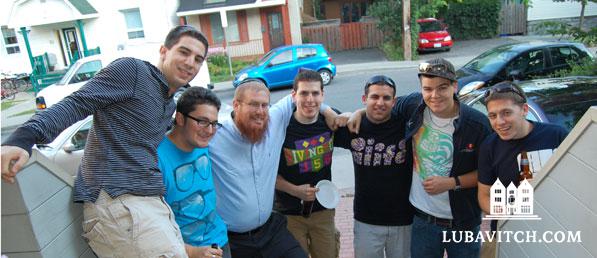(lubavitch.com) Jeremy Izfo may soon be analyzing debt-to-earnings ratios of Fortune 500 companies, but today the economics major at Carleton University in Ottawa, Canada, is looking at Chabad on Campus’s bottom line.
“There are other places that promote hanging out with Jewish people, but Chabad takes a different route. Everyone knows that Chabad is the place to go to be involved with Jewish life,” said Izfo.
The number of Chabad centers on Canadian campuses has doubled over the last five years. Today, 19 campuses benefit from Chabad representatives on site. Another eight are served by Chabad centers in the area. For Canadian university students facing growing anti-Israel sentiment and harassment from pro-Palestinian activists, Chabad’s more visible presence on campus is welcome.
“There’s a lot of tension between Muslim and Jewish students. We are small in number, but we have a lot of pride, and we make sure everyone knows who we are,” Izfo said.
Posters plastered around Carleton depict a mockup of an Israeli helicopter dropping bombs on a teddy-toting Palestinian toddler. The student council is run by pro-Palestinian representatives. Professors make no secret of their anti-Israel leanings. Even apolitical Jewish students feel uncomfortable and confused.
“The propaganda’s logic is backwards, but convincing,” said Mrs. Yocheved Boyarsky, Chabad representative at Carleton and Ottawa U. “Students come to Shabbos dinner with us despite a very anti-Israel outlook. We encourage them to think, to question, and to see the issue through the broader view of history.”
In Ottawa, Jewish students represent only two percent of the student body. But group size does not seem mitigate the threats and taunts. York University, a commuter college near the Jewish community in Toronto, is one of the top ten universities attended by Jewish students in Canada. Yet the feeling on campus is stridently, sometimes violently anti-Israel. Last year, Jewish students at York were forced to barricade themselves inside the Hillel offices when an angry mob chased them: “Die, Jew, die, Get the hell off campus!” they screamed.
Brenda Grinsaft, a psychology major at York, is reluctant to overstate the threat. She feels safe at York, but “there is hostility” toward Jewish students. “Chabad is where Jewish students can go to feel comfortable being Jewish and proud of it,” Grinsaft said.
Countering the anti-Israel activism, Chabad at York is offering an encore round of “The Land and the Spirit” course. A probing look at the centrality of Israel to Judaism developed by the Jewish Learning Institute, the course helps students who want to understand the Jewish claim to the land of Israel, Chabad at York co-director Chanah Leah Bekerman explains.
Even students raised in traditional Jewish homes are not immune to pro-Palestinian pressure on campus. “A lot of students have parents who support Israel, actively, financially. And we have a lot of students who are pro-Israel. But a number of them are not. It is more popular to take a lefty, ‘pro-peace’ stand,” said Mrs. Basya Feldman, Chabad representative at Dalhousie University in Halifax, Nova Scotia.
Dr. Gil Troy, a history professor at McGill University in Montreal and author of Why I am a Zionist told Lubavitch.com that a lot is riding on the countersteps to the toxic propgaganda. “At university campuses in Canada and in the U.S., many future leaders are being educated in poisoned environments, where Israel is portrayed as the bad guy.”
Chabad’s response is less about shouting down and in-your-face protests than about teaching students to connect with their own heritage, and understand the Jewish claim to the land.
The Rohr Chabad Centre for Jewish Life at the University of Waterloo and Wilfrid Laurier University, directed by Rabbi Moshe and Rivky Goldman, introduced the J-Learn program this year, a series of mini-courses to help students acquire fundamental knowledge of Judaism. Mrs. Goldman expanded her Girls Club to offer Jewish women on campus evening classes about Judaism in a sorority-like atmosphere. Despite anti-Israel bullhorn tactics, Rabbi Goldman finds students open to different opinions.
“Canadians are polite. When I speak on Friday night, there is a greater chance that people will listen, take it seriously,” Rabbi Goldman said.
Prof. Troy promotes advocacy in his literature, but he also values Chabad’s approach. “Studies show that if you have a strong connection to Judaism, you will have a strong connection to Israel.” Chabad, he explains, “creates a spiritual conversation and a cultural conversation, getting the issue away from politics,” which helps achieve the ultimate goal: supporting the Jewish homeland.
“You can’t do Jewish without embracing Israel.”
The toughest time for Jewish university students on campus in recent years has been the annual “Israel Apartheid Week,” which often goes hand in hand with harassment of Jewish students. Founded in Toronto, IAW spread to 40 cities, 14 of which are in Canada.
In preparation for IAW last year, students at York University brainstormed for ideas to counter the darkness with light. They organized a Mitzvah Marathon at York, where student—Jewish and non-Jewish, alike—filled out cards, pledging to perform good deeds. They sold brownies with proceeds that went to Chabad Terror Victims Project of Israel.
Chabad at Ottawa U hosted a similar program to encourage students to perform a mitzvah. They set out a table filled with mitzvah opportunities against a backdrop of the Western Wall, right alongside the IAW row of tables.
“A lot of students tell us they felt comforted and encouraged to walk by and see our table during the week of hatred,” said Mrs. Boyarsky. Performing mitzvot is more than a nicety, a comfort zone among the vitriol. “Historically, Jews have been victorious over threats to their existence by strengthening their performance of mitzvos and staying with the Torah.”

Be the first to write a comment.